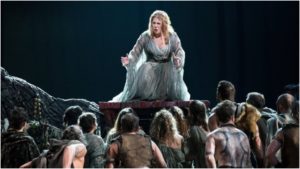
Opera Profile: Bellini’s Tragic ‘Norma’
By David SalazarBellini’s “Norma,” which premiered on Dec. 26, 1831, is arguably one of the finest operas to come out of the bel canto repertoire.
Many consider it Bellini’s finest dramatic work overall and it features one of the most challenging roles for a soprano. In fact, sopranos have often been defined by their interpretation of the opera.
Written by Felice Romani, the opera was popular from the get-go, even becoming one of the favorites of Richard Wagner. The famed composer even added his own aria for bass and men’s chorus when he conducted the work in Riga in 1837. “In this opera, Bellini has undoubtedly risen to the greatest heights of his talent. In these days of romantic extravaganzas and the hyper-excitement of the so-called musical attractions he presents a phenomenon which can hardly be overrated. The action, free from all theatrical coups and dazzling effects, reminds one instinctively of a Greek tragedy,” Wagner wrote of the work.
Short Plot Summary
Oroveso and the Druids pray for help against the invading Romans. Pollione, one of the soldiers of the Roman army tells his friend Flavio that while he is married to the Druid Priestess Norma, who is not allowed to marry, he is now in love with Adalgisa.
Adalgisa meets with Pollione who begs her to come with him to Rome. Though she initially rejects him, she eventually concedes.
Norma learns that Pollione is going to Rome and is upset because she is unsure whether he will take her and the two children he bore her. Adalgisa confesses of her feelings for a Roman. Norma chides her but suddenly Pollione arrives on the scene and the two priestesses realize that the love triangle they are now entangled in.
Norma attempts to kill her own children but can’t do it. Adalgisa arrives and promises to give up Pollione. The two sing of their renewed friendship. Norma meets up with the other Druids and calls for war, after which Pollione is captured and brought to her. Norma confronts Pollione alone, demanding that he give up Adalgisa. She calls on the Druids to sacrifice a priestess who has broken her vows and reveals that she has done so and must be burned. She begs for her children’s safety and then dies immolated alongside Pollione, who has reclaimed his love for her.
Famous Musical Passages
“Norma” is rife with famed musical passages, none moreso than the title character’s opening aria “Casta Diva.” The passage is emblematic of Bellini’s “never-ending” melodies that so inspired Wagner. But the opera also has one of the great mezzo and soprano duets in the history of opera, as Norma and Adalgisa swear friendship. Norma arrives and calls for peace.
Watch and Listen
No singer quite defined this opera the way Maria Callas did in her time. Her recording remains the standard by which most sopranos measure themselves or are measured. Here is arguably her most famous interpretation on record with Franco Corelli as Pollione, Christa Ludwig as Adalgisa, and Nicola Zaccaria as Oroveso.
Categories
Opera Wiki

